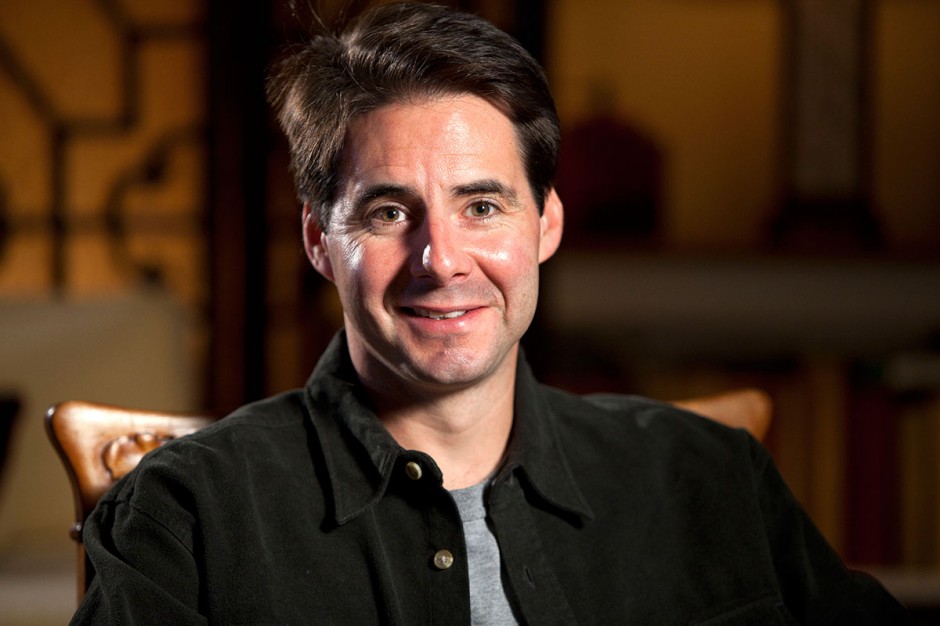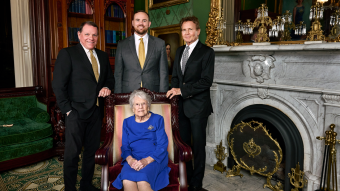
On his way to middle school, Peter Hessler often rode past the Ming-dynasty lion statues that guard the entrance to the School of Journalism on Ninth Street, a precursor perhaps of adventures to come and a life he never would have imagined as a child.
Now an award-winning author and literary reporter, Hessler writes about his adventures as a global citizen in countries where the language, politics and culture offer unusual challenges.
None of it sounds easy. To write his articles for The New Yorker, Hessler lives in Egypt with his wife and twin toddlers and is developing proficiency in Arabic. To write his books on China, Hessler lived in the country for two years, learned Mandarin Chinese and developed the mettle to interact with people who weren’t particularly interested in getting to know a foreigner.
MU will recognize Hessler May 18 with an honorary degree during the commencement Honors Ceremony. It’s a fitting return home for the Columbia native, who says he feels honored to receive the degree from Mizzou.
“It meant so much to grow up in a university town, especially one with such a strong tradition of journalism and creative writing,” Hessler says.
Mizzou connections
Hessler grew up in the shadow of the Columns, about a mile from campus on Westmount Avenue, where much of his early life intersected with Mizzou and with academia. Hessler is the son of MU Professor Emeritus Richard Hessler and Columbia College Adjunct Professor Anne Hessler.
“It was a wonderful place to be a kid. The university was so close that it essentially became my back yard. I knew the layout of every building on Francis Quad, especially the old sociology building, where my father was a professor,” he says.
The School of Journalism gave young Hessler his first job in journalism in 1978 when he was in third grade. As part of his daily routine, Hessler would wake up at 5 a.m. to deliver the Columbia Missourian before school. He kept the job for six years and, at the same time, began developing a “voracious” appetite for reading newspapers.
For Hessler, there were other brushes with MU that he credits with helping him realize a writing career was possible, not just an abstract dream.
The Hessler family, including Peter’s three sisters, lived one block from Professor William Peden, a novelist and founder of the University of Missouri Press. Hessler was particularly interested in fiction when he was a student at Hickman High School, so he “carefully” read MU’s literary journal, The Missouri Review. He also became aware of Mizzou writers such as alumnus William Least Heat-Moon.
After graduating from Princeton University and while waiting for his application to the Peace Corps to be processed in 1996, Hessler spent nearly a year in Columbia. He made use of the time by tutoring at MU’s Writing Center, run then by Professor Elaine Hocks, and teaching a couple sections of English composition, “a great experience” that helped prepare him for teaching in China.
Hessler also formed a lasting relationship with Douglas Hunt, then director of the Campus Writing Program. Hunt was the first to read a draft of and comment on Hessler’s book about his experiences in China. The book, River Town: Two Years on the Yangtze, won a Kiriyama Prize for encouraging understanding of the cultures of the Pacific Rim and South Asia.
Since then Hessler has asked Hunt, now an emeritus professor, to help edit “pretty much everything I’ve written,” which includes four books.
Quiet life in Cairo
Hessler, his wife, non-fiction writer Leslie Chang, and their 2-year-old daughters live on Zamalek, a green and relatively quiet island in the Nile.
The Hesslers’ home is on the ground floor of a beautiful old building with high ceilings and Art Deco design touches. There’s a garden where the twins can play, but at the same time, the residence is just a bit more than a mile from Tahrir Square and downtown Cairo.
“If something happens in the city, I can get out quickly and report on it. I’ve spent a lot of time on Tahrir, that’s for sure,” Hessler says.
Hessler finds it easier being a foreigner in Egypt than it was in China, where decades of Maoist isolation still affect the Chinese people. Egyptians are very comfortable with foreigners, he says.
“Life here feels surprisingly normal. This is probably the hardest thing to communicate to people in the States because the images they see on television are often very violent,” Hessler says.
Because the unrest in Cairo is usually localized, Hessler doesn’t consider it an issue for a foreign journalist. Even as protests erupt on Tahrir Square, life in Cairo often goes on as normal, with people calmly sitting at coffee houses or shopping.
“My feeling has always been that Egypt will survive this transition period without too much violence. Clearly there’s something that holds society together despite the political chaos. Some of it is religion, and some of it is a tradition of community feeling,” Hessler says.
Even for locals, the current press freedom in Egypt is remarkable, Hessler says. He sees no comparison with the routine censorship and arrests of journalists that occurred before the revolution.
A great deal of Hessler’s material comes from his daily routine, and he often writes about the lives of ordinary people. Hessler knows all the people at the local shops on the active street by his house. One of the people he talks with most is a garbage man, Said, who sometime stops by for dinner. “Picking up garbage is a much more personalized task here in Egypt,” Hessler says of the relationship.
Lately Hessler has been traveling regularly to research the rural areas of Upper Egypt in the southern part of the country, which has helped him gain a better understanding of Egypt. His work in Egypt is funded by a “Genius Grant,” a prestigious fellowship funded by a MacArthur Foundation.
Learning the language
The Hessler twins, Ariel and Natasha, are learning Arabic the easy way, by natural assimilation, and understand it quite well for their age. The girls attend a neighborhood nursery school and have an Egyptian nanny who speaks only Arabic with them. Many of their first words were in Arabic.
Their parents, however, are learning Arabic through classes, exams, tutors and lots of study sandwiched between writing assignments. It’s not easy, but the Hesslers wanted to move to a place with a rich language and a rich history that “stretches back to ancient times.” The Hesslers say the Middle East was a natural choice for them.
“Arabic is hard, but it’s significantly easier than Chinese. I can hold a very good conversation and do a solid interview on my own,” Hessler says. He still needs a translator for more sophisticated topics, but he has friends who don’t speak English, which is a big step.
In China, Hessler learned Mandarin quickly, gaining oral fluency in two years. After leaving the Peace Corps and becoming a journalist, he never had to use a translator.
“I lived in a small city with only one other foreigner, and we had no Internet access. There wasn’t much to do apart from wander around and talk to people,” he says of his time in China.
Hessler isn’t sure how his international wanderlust developed. His father had a sabbatical in Sweden in 1977-78, so Hessler attended a Swedish school there, which had a big impact on him. Still, he couldn’t speak any foreign languages when he graduated from college, and he had never traveled in the developing world.
After college, he believed he should spend time in a place less developed than the U.S. and with a different culture. He sensed it would be critical to his development as a writer, so he joined the Peace Corps and believes that a similar experience would be good for anyone.
“The main benefit was that it gave me a new perspective. On the most basic level, it’s valuable to live in a place where you look totally different from everybody else. It makes you much more sensitive and sympathetic to outsiders after you return home,” he says.



